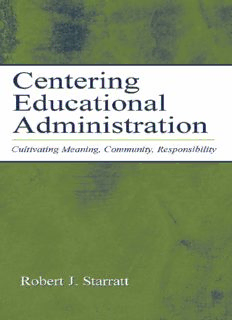
Centering Educational Administration: Cultivating Meaning, Community, Responsibility (Topics in Educational Leadership) PDF
Preview Centering Educational Administration: Cultivating Meaning, Community, Responsibility (Topics in Educational Leadership)
CENTERING EDUCATIONAL ADMINISTRATION Cultivating Meaning, Community, Responsibility Topics in Educational Leadership Larry W. Hughes, Series Editor Gaynor (cid:1) Analyzing Problems in Schools and School Systems: A Theoretical Approach Earle/Kruse (cid:1) Organizational Literacy for Educators Shapiro/Stefkowitz (cid:1) Ethical Leadership and Decision Making in Education: Applying Theoretical Perspectives to Complex Dilemmas Bizar/Barr, Eds. (cid:1) School Leadership in Times of Urban Reform Brouillette (cid:1) Charter Schools: Lessons in School Reform Fishbaugh/Schroth/Berkeley, Eds. (cid:1) Ensuring Safe School Environments: Exploring Issues—Seeking Solutions Starratt (cid:1) Centering Educational Administration: Cultivating Meaning, Community, Responsibility CENTERING EDUCATIONAL ADMINISTRATION Cultivating Meaning, Community, Responsibility Robert J. Starratt Boston College LAWRENCE ERLBAUM ASSOCIATES, PUBLISHERS 2003 Mahwah, New Jersey London This edition published in the Taylor & Francis e-Library,2008. “To purchaseyourown copy of this or any of Taylor & Francis or Routledge’s collection of thousands of eBooks please go to www.eBookstore.tandf.co.uk.” Copyright(cid:2)2003byLawrenceErlbaumAssociates,Inc. Allrightsreserved.Nopartofthisbookmaybereproducedin anyform,byphotostat,microform,retrievalsystem,oranyother means,withoutthepriorwrittenpermissionofthepublisher. LawrenceErlbaumAssociates,Inc.,Publishers 10IndustrialAvenue Mahwah,NewJersey07430 CoverdesignbyKathrynHoughtalingLacey LibraryofCongressCataloging-in-PublicationData Starratt,RobertJ. Centeringeducationaladministration:cultivatingmeaning,community,responsibility/ RobertJ.Starratt. p. cm. Includesbibliographicalreferencesandindex. ISBN0-8058-4238-1(cloth:alk.paper)—ISBN0-8058-4239-X(pbk.:alk.paper) 1.Schoolmanagementandorganization—Studyandteaching(Higher). 2.School administrators—Trainingof. I.Title. LB2805.S7438 2003 371.2(cid:3)0071(cid:3)1—dc21 2002192726 CIP ISBN 1-4106-0730-5 Master e-book ISBN Contents Preface vii PART I: ELEMENTS OF THE LEADER’S VISION 1 1 The Challenging World of Educational Leadership 3 2 Cultivating Meaning 27 3 Contested Meaning: Schooling Within the Legacy of Modernity 43 4 Educating for Community: Modernity’s Challenge 66 5 Cultivating a Mature Community 81 6 Cultivating Responsibility 100 7 Cultivating Responsibility To and For Learning 122 8 Cultivating a Responsible Community 137 v vi CONTENTS PART II: BRINGING THE VISION TO REALITY 157 9 Cultivating a Perspective on Learning 159 10 Empowerment 183 11 Organic Management for Student Learning 197 12 Leading by Design: The Medium Is the Message 214 13 Leading a Learning Community 224 14 School Administration as Autobiography 242 Author Index 255 Subject Index 261 Preface Thisbookhasbeenwrittenoutofaconvictionthateducationaladministra- torpreparationprogramsneedtobecomemoreresponsivetochangesand challenges in the complex and dynamic social arena we call education. Thesechangesandchallengesareembeddedinthelocalandregionalpo- liticalcontextofschooling,innewapproachestoteachingasaprofession, and in the federal and state public policy regarding standards of student achievement.Oneofthefirstcoursesinagraduateprogramineducational administrationisusuallyacourseonfundamentalsorfoundationsofedu- cationaladministration.Thisbookisanattempttohelpbeginningadminis- trators, or those seeking state certification to become administrators, get startedontherightfootinaprogramthatwillbuildontheperspectivesde- veloped in such a beginning course. Afundamentalscourseshouldintroducethebeginningadministratorto theessentialsofadministeringanindividualschoolorofbeingamember of an administrative team in an individual school. Those who are moving intodistrictofficeadministrationorstateeducationdepartmentscanlearn more about their responsibilities in courses dealing with district- or state- leveladministration,althoughIwouldhopethatthosecoursesalsopointto the individual school as the place where their efforts will bear fruit (El- more, 2000). Evenwhenotherfundamentalstextsineducationaladministrationcon- centrate on the individual school site, they tend to provide treatments of discretefunctionsofadministration.Hence,wefindchaptersdealingwith special education, extracurricular programs, testing and counseling pro- grams, parent and community relations, scheduling, resource allocation, vii viii PREFACE communication, decision making, delegating responsibilities, legal and safetyconcerns,andsoon.Againwefindadiffusionoffocus—asampling of functions that, although touching on real concerns for school adminis- trators,revealthetreesbutprovidelittlesenseoftheforest.Thisbookasks the large question: What is fundamental to educational administration? What is its center? Inresponse,wefocusattentiononthreethemesthatarefundamentalto the work of educational administration: cultivating meaning, cultivating community,andcultivatingresponsibility.Thesethemesnecessarilyinvolve perspectives derived from philosophical and sociological scholarship. In some administrative preparation programs, students are encouraged to takephilosophyofeducationorsociologyofeducationcoursesasawayto develop a broad understanding of the contexts and purposes of school- ing—anunderstandingthatwillenablethemtobringtheseperspectivesto bear on their work of leading schools. Valuable as these courses are, they are rarely taught with the work of school administration in mind, but as more general courses for all students of education. This book attempts to bring philosophical and sociological perspectives to the very work of ad- ministration,suggestingthattheyilluminatethechallengesthatconstitute the substance of administrative work in education. With clarity about their responsibilities in these three areas, administrators can provide a focus to theirdecisionmaking,resourceallocation,communicationprocesses,and parent–community relations. SCHOOL ADMINISTRATION IN HISTORICAL CONTEXT Thereisanevenmorepressingneed,however,foranotherchangeinthe fundamentals course. Past administration courses have tended to reflect limited and fragmented conceptual frameworks that derive from earlier historicalandtheoreticaldevelopmentsinthefieldsofeducationandedu- cational administration. Murphy and Beck (1993) provided a historical overview of the metaphorical themes that shaped understandings of principalshipduringthepast70yearsintheUnitedStates.Theirstudyindi- cateshowthewaysofunderstandingtheprincipalshipwereinfluencedby historical events such as the Great Depression, World War II, and the suc- cessoftheSovietspaceprogram.Thepoliticalandacademicworldsinflu- enceddifferentperiodsofschooladministrationintheUnitedStateswith variousconcerns,suchassocialhomogenizationofdisparatecommunities of immigrants, scientific management, and accountability for measurable student learning. WhereasBeckandMurphypointedtothefluctuationsofthoughtabout school administration, the critiques of Greenfield (1991), Foster (1986), PREFACE ix Bates (1984), Carr and Kemmis (1986), among others, challenge the grounding of administrative theory and practice in rational decision mak- ing and scientistic rationalism. This book stands firmly with their conten- tions that much of what has been considered mainstream educational ad- ministration literature makes unsupportable assumptions that (a) truly professionaladministratorsmakerationaldecisionsbasedonfactsderived from scientific research; (b) educational administrators work within (or can create) rational organizational systems; and (c) they can control the schoolasanorganization(and,indeed,havetheresponsibilityandrightto do so) by applying scientifically grounded knowledge to make the school workaccordingtorationallyderivedgoals.Wetakeupthatcriticisminthe early chapters of the book. EDUCATIONAL ADMINISTRATION AND CRITICS OF THE SCHOOLS Forthepastquartercentury,schoolshavecomeunderrelentlesscriticism fromboththerightandtheleft.Thecriticismfromtheright,fueledbyare- sentment toward “The 1960s,” when schools and universities were per- ceivedbycriticsasfounderinginadirectionlessseaofpermissiveness,has focused on the supposed abandonment of “the three Rs”—the pandering to fads such as nurturing self-esteem (disconnected, they assumed, from the achievement of rigorous standards), multiculturalism (which was equated with disparagement of patriotism as well as the Eurocentric can- nonsofliteratureandhistory),andcreativity(equatedwithastandardless aestheticandanti-intellectualbias).Thecriticismfromtheleftfocusedon theschoolasaninstrumentofthesociopoliticalreproductionofinequality throughitssystemsofcurriculumtracking;thedeadendofspecialeduca- tion programming; the ambivalence of bilingual programs toward foreign cultures;thepredominanceofmaleperspectivesinpedagogy,learningthe- ory,andcurriculumprogramming;andtheperpetuationofacademicfail- urethroughbureaucraticlabelingofat-riskstudentpopulationsandthese- riouslackofearlyresourcingofremedialprogramsintheearlygrades.In other words, the left argued, schools have not responded to the “war on poverty” and the racial desegregation of public life, nor to the emerging promise of feminists perspectives in schools. Instead, schools have contin- uedtopourthenewwineofprogressivepublicpolicyintotheoldwineskins of institutional status-quo arrangements. Fromeitherperspective,theprimaryvillainswerethemindless,ineffec- tive educators who appeared rudderless—without a policy compass or the leadershiptoarticulateacleardirectionfortheschool.Indeed,thecritics were right in this regard: The educational community seemed to lack the
Description: